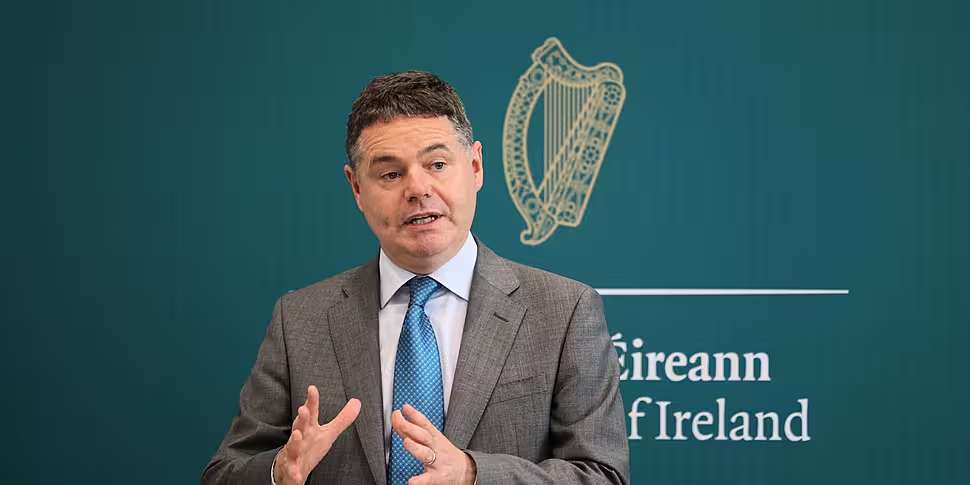Ireland will sign up to an OECD deal on corporation tax that will see the rate increase to 15%.
The Cabinet has approved the move, spelling the end for the long-held 12.5% rate.
Finance Minister Paschal Donohoe says it was a "difficult and complex decision" but he believes it is the right one.
However, there will be no change to the 12.5% rate for businesses with revenues below €750m.
The OECD is to meet on Friday to agree the statement and an implementation plan.
Minister Donohoe says it will likely be 2023 when the new, higher rate of corporation tax will be in place.
And he says he cannot be sure how much this deal will actually cost Ireland - but that there would be a reputational loss to not signing up.
The proposed minimum effective tax rate of 'at least 15%' has been set to a precise rate of 15%.
Minister Donohoe briefs media on decision for Ireland to enter OECD International Tax agreement https://t.co/KhY9sgKoOt
— MerrionStreet.ie (@merrionstreet) October 7, 2021
Minister Donohoe says: "The agreement provides that the minimum effective rate for multinationals with an annual revenue in excess of €750m is 15%.
"We have secured the removal of ‘at least’ in the text.
"This will provide the critical certainty for Government and industry and will provide the long-term stability and certainty to business in the context of investment decisions.
"This 15% rate will apply to 56 Irish multinationals employing approximately 100,000 people, and 1,500 foreign-owned MNEs based in Ireland employing approximately 400,000 people.
"Furthermore, the vast majority of businesses in Ireland will be outside the scope of this agreement, and there will be no change to their corporation tax rate.
"This is important for the domestic economy and the thousands of SMEs that operate here."
He adds that for the 160,000 businesses with a turnover less than €750m per year, who employ some 1.8 million people, "there will be no change to their corporation tax rate of 12.5%."
"I am confident that Ireland will remain competitive into the future, and we will remain an attractive location and ‘best in class’ when multi-nationals look to investment locations", he says.
Read the Minister's speech in full here
Business reaction
The head of IDA Ireland, which attracts foreign direct investment to Ireland, says he does not believe the change will 'adversely impact' on the economy.
Martin Shanahan says: "I believe that the changes resulting from Ireland's participation in the global tax deal are not likely to adversely impact Ireland's existing base of foreign direct investment.
"Ireland will remain competitive from a tax perspective and the recent changes to the draft OECD agreement secured by Ireland provide clarity on the global minimum rate that will apply for large companies, making it possible for Ireland to continue to provide stability for investors.
"Investors’ confidence in Ireland remains strong as evidenced by the investment flow over recent months and years".
He adds: "Tax is important but it is but one part of Ireland's proposition and it is imperative that we continue to remain competitive on all aspects of our investment offering, given the level of global competition for the investments we are trying to attract.
"There is still a lot of detail to be worked out around the implementation of this global agreement, but there is no reason that Ireland cannot continue to build on the very strong existing base of FDI that we have built up, provided we continue to do the right things."
'Predictability and certainty'
Ibec says the announcement "is the right decision at the right time"
CEO Danny McCoy says: "We had been fully supportive of the Government’s approach of consulting with stakeholders and waiting for further detail and clarity on key questions before making firm commitments concerning our direct investment regime for foreign and Irish headquartered companies.
"Today's outcome with a firm commitment to a 15% minimum rate, and no more, is a vindication of the State's position and will provide welcome certainty for small open economies.
"We also welcome proposals for Ireland to maintain its 12.5% regime for those companies not in scope of the agreement."
While the American Chamber of Commerce Ireland says it also welcomes the move.
Its CEO Mark Redmond says: "AmCham has always been steadfast in our support of current and previous Governments’ robust defence of our corporate tax regime.
"Ireland’s track record of success in attracting inward investment, has been driven in part by the certainty provided to those who choose to invest and create jobs in Ireland.
"US FDI in Ireland accounts for 20% of private sector jobs through direct and indirect employment.
"AmCham believes that today’s announcement coupled with the removal of the wording of 'at least' from the proposals, in addition to clarification obtained from the European Commission has ensured that the revised agreement ensures essential predictability, stability and certainty for multinational employers."
And head of tax with Deloitte, Lorraine Griffin, says the devil will be in the detail.
"It is positive for the Irish domestic economy, in particular, that the Government has secured assurances that the 12.5% rate will continue to apply to companies with revenues below this threshold and reflects the constructive way that Ireland has engaged with the process.
"From an impacted corporate group’s perspective, the effect of these measures will depend on its global footprint overall, and whether they are currently doing business in higher or lower taxed jurisdictions.
"This will determine the overall impact on its final tax position under the new OECD proposals.
"As they say the devil is in the detail - and the detail on the final design of the new rules, how effective tax rates are to be computed, and what carve outs or exceptions might impact the operation of the rules is not yet fully known."
And she says an implementation date of 2023 is ambitious.
"A lot of heavy lifting will be required in 2022 if an implementation date of 2023 is to be achieved and it is critical that a high level of engagement with Irish businesses occurs to ensure that the concerns of all relevant stakeholders are heard.
"Therefore, it's not as straightforward as comparing a company's effective tax rate position today with the proposed global 15% minimum tax rate - but directionally for those companies currently with low effective tax rate positions it sounds like the only way is up."
Speaking to Newstalk on Wednesday, Sinn Féin finance spokesperson Pearse Doherty said the Government 'failed spectacularly' to keep hold of Ireland's 12.5% corporate tax rate.
But he acknowledged that Ireland was unlikely to win this on its own.
"I think, to be fair, the odds were stacked against us from the get-go in relation to this.
"Some of that is the result of our own, or the Government's own, allowance of aggressive tax planning in our code.
"But let's be clear: the Government's objective here was to secure the 12.5% tax rate within the OECD framework, after the 130 countries agreed in principle to the 15% rate.
"On that measurement, there's no doubt about it: we failed and failed spectacularly".
Reporting by: Sean Defoe









